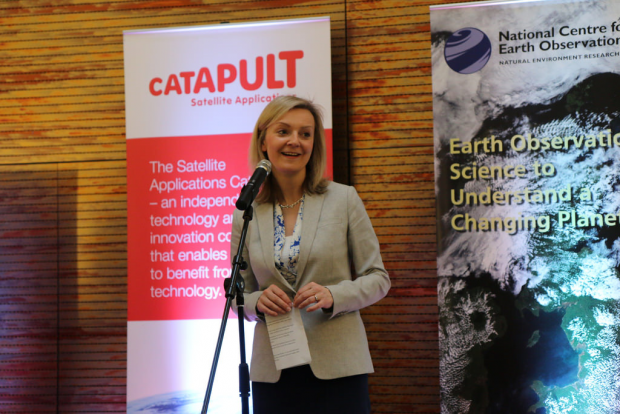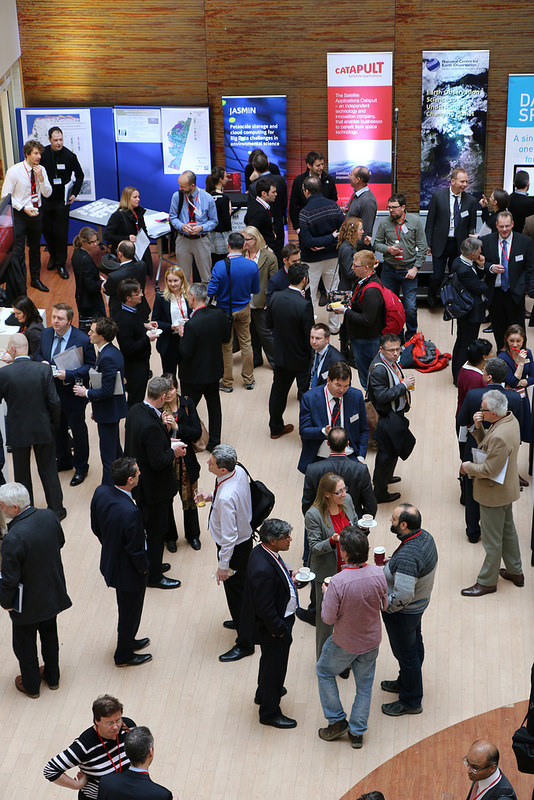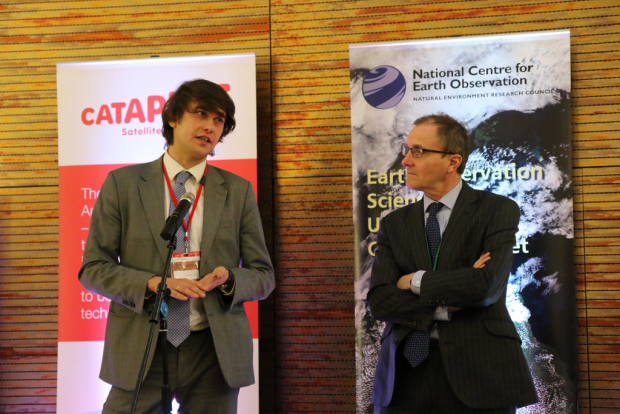Earth Observation (EO) is transforming our understanding of land use and the environment, and how they are changing, by harnessing the possibilities of the new data becoming available via satellites and other new technologies.
The Event
Around 170 people from Defra, Government, industry and academia participated in an Earth Observation and Open Data Showcase on 2nd February hosted by The Department for Environment, Food and Rural Affairs (Defra), in partnership with the UK Space Agency, Space for Smarter Government Programme (SSGP), the Knowledge Transfer Network (KTN), the National Centre for Earth Observation (NERC), and the Satellite Applications Catapult. With 10 exhibitors and 16 different seminar sessions running throughout the day, there was plenty of opportunity for knowledge exchange and networking.
The event was designed to encourage the Earth observation community to explore how to exploit available data to help deliver better outcomes for the Defra Group and the rural community.
Open Defra
The event was part of the #OpenDefra week where Defra is exploring the potential of our data and how to get the best out of it for the environment, the economy, and rural communities. Earth observation and mapping is one of the most exciting areas where data (both open and shared) is already making a difference. For example, during the flooding in December and January the EU Copernicus Emergency Management Service was utilised to produce flood estimates of areas using radar satellite systems, which contributed to the management and recovery operations.
 Speaking at the event the Defra Secretary of State, The Rt Hon Elizabeth Truss MP said: “Data and smart ways of working should be at the heart of everything government does, which is why we’re working with experts in the field to realise the potential of Earth observation data”.
Speaking at the event the Defra Secretary of State, The Rt Hon Elizabeth Truss MP said: “Data and smart ways of working should be at the heart of everything government does, which is why we’re working with experts in the field to realise the potential of Earth observation data”.
Event Seminar Sessions
The seminar sessions covered a wide range of topics and with rooms full to capacity; ideas were exchanged between industry, academics and policy makers and deliverers. Cross cutting themes and ideas that emerged include:
- initiatives to encourage greater sharing of public and private sector data in the precision farming sector in order to stimulate solutions for sustainable food production;
- seeking ways to exploit Earth observation data for the mapping, valuation and enhancement of natural capital;
- encouraging Big Data approaches to mapping changes in the countryside in an automated fashion and reducing burden on farmers, growers and inspectors alike; and
- approaching the procurement of novel national datasets, such as a national crop map in an coordinated fashion to encourage wider uptake and application of the information available.

Attendees were enthused about the potential that an open approach could bring, particularly given the UK’s leadership in this area. The event was successful in raising Defra policy awareness about the opportunities Earth observation offers. Equally, industry heard about our big policy challenges.
Defra policy officials said ‘it was fascinating to hear more about how Earth observation technology has the potential to help us in policy and delivery’, and ‘the event was a great opportunity for discussions about the technologies available and the solutions these might provide’.
Industry participants noted that ‘it is incredible to see how advanced the UK is in Earth observation’, and ‘the event was an excellent example of the UK Government's commitment to bring businesses and academia together, it felt like solving scientific problems and boosting the UK's technology brand was at the heart of this event’.
Industry views were strongly supported by the research and innovation communities noting that: ‘the showcase did exactly what it says on the tin, demonstrating this fantastic capability as well as catalysing the space by building connections and opening the Aladdin’s cave of data to policy makers’.
Looking to the Future

Guest speaker, Andreas Veispak (European Commission, DG Internal Market, Industry, Entrepreneurship and SMEs) said that the UK is now the ‘benchmark’ for all EU activities to promote the use of Copernicus and encouraging greater public-private sector dialogue in exploitation of Earth observation. Defra is keen to maintain this reputation and continue to strive forward in not only the use of available data, but in the provision of data to the benefit of the UK.
The overall mood was captured by Professor Ian Boyd, Defra Chief Scientific Advisor, who spoke at the event: “We’re ascending to the crest of a wave of open access Earth observation data. When this is considered alongside new cloud computing technology, a multitude of SMEs harbouring some superb skills, some big companies looking to brigade the data and make it accessible, and customers like government becoming more aware of what Earth observation information can do to change ways of working, then I think this adds up to a revolution.”
So what happens now?
The Defra Earth observations team will be reviewing all the notes and comments captured in the seminars, following up on any post event emails and feedback. We will be looking to ensure that the connections made at this event are not lost and we continue to achieve benefits for the UK that can be realised from Earth observations data. Watch this space!
If you want to contact the Earth observations team, please do so at earth-obs@defra.gsi.gov.uk
Updated 08/02/16: To add list of event partners
Recent Comments